According to the 2017-2018 APPA National Pet Owners Survey, every 7 out 10 of U.S. households own a pet. Many people like to keep a fish, dog, cat or a parrot as their pets. And while having an animal companion can be fun, properly keeping and training a pet isn’t an easy job, especially when you are unaware of the essential caring tips.
See also:
It is imperative that one person should learn proper caring tips to keep their pets happy. Someone love to adopt smaller pets such as puppies and kittens. Keeping puppies or kittens as a pet is a different story when compared to having an adult dog or a cat as a pet.

Your behavior towards your pets determines the kind of relationship you’ll have with them. You probably are someone has meant to adopt a puppy. This article can help you out as we will discuss the important tips you should know about when it comes to taking care of a 6 weeks old puppy.
Can you take a puppy home at 6 weeks?
Dogs are popular pets worldwide as being the most loyal ones. This is the reason why everyone adopts a puppy because they want to have a dog that would be loyal, offer love, support, and even protection.
However, keeping a puppy as a pet is not an easy job. It is just like taking care of a 6 weeks baby. If you are planning to have a 6 week puppy, you should know some of the basics that cover food, hygiene, and more.

How to take care of a 6 week old puppy
What to Feed a 6 week old puppy and feeding schedule
A 6-week puppy caring totally depends on you just like a small baby. A 6-week old baby puppy can eat solid foods and this does not depend on their mother’s milk. So, you should know about foods to give your puppy.
Such a small puppy cannot eat large and heavy portions of dog meals. Take note that it is very important to feed your puppy throughout the day in small portions. You should be present at the time of feeding your puppy as to keep a check on their meal.
You can feed your puppy with good quality of pup food or raw diet. Your 6-week old pup does not need any milk supplements at this age. You can increase the number of meals in the 8th week but not before that. Also, do not overfeed your puppy.
Milk is said to be the most energetic drink for humans, but cow’s milk may cause diarrhea for dogs. You enable to give them goat milk instead if he or she is not eating food properly. On the one hand, you could feed your puppy soft food items, specially created for puppies.
“Most dogs can drink cow’s milk or goat’s milk, however some dogs may be allergic or lactose intolerant,” Dr. Stephanie Liff, DVM and owner of Pure Paws Veterinary Care of Clinton Hill Brooklyn, N.Y
Water is also important for hydration your puppy. Keep hydrated and healthy by giving him or her the proper amount of water time to time. Water plays a key role if a puppy is suffering from diarrhea. Always have a filled bowl of water available for your puppy.
Always ensure plenty of fresh, clean drinking water is available. The dog will need to drink plenty to replace fluid lost in diarrhea. If he isn’t drinking, then dehydration is a risk, so seek vet advice as to whether he should be seen. Said by Dr Pippa Elliott – Via dogs.lovetoknow.com
Do not switch the puppy food brands continuously. This is because switching of brands can lead your puppy to experience digestive problems. Also, search for the best brands and then try to stick to one brand of food.
You should follow the guideline on the food packs to avoid over-feeding.
Exampe of an ideal PUPPY FEEDING SCHEDULE
6:30 a.m. wake up, quick exercise 7:00 a.m. morning meal, outdoor walking, playtime then back to crate 10:00 a.m. outdoor walking, bonding time with owner then back to crate 12:00 (noon) midday meal 1:00 p.m. outdoor walking, playtime then back to crate 5:00 p.m. evening meal, outdoor walking, playtime 7:00 p.m. short outdoor walk, playtime, then back to crate 9:00 p.m. bedtime (in his crate or in your bedroom) Via: petmd.com
How much do 6 week old puppies sleep
Another important thing is to check the pup’s sleeping schedule. A 6-week old pup needs a lot of sleep.
Please keep in mind that your 6-week old puppy needs almost 18 hours of sleep because she or he still is a baby. You should provide your puppy with the best shelter to sleep in.

Sleeping also helps your pup when it comes to developing its immunity system. The more rested it feels the more energy your pup will have to play.
Some essentials for caring a puppy
If you own a 6-week old puppy, then you should know that your pup needs their own shampoo. A doggy shampoo is a must buy for your puppy. Opt for a good-quality product. You don’t want your pet to experience skin problems due to a bad product!
Just like a newly born baby, your puppy also needs some toys to play with. A small sized ball is a good choice when buying toys for your puppy. There are many puppy toys you can choose from.
A pup house
It is very important to provide your puppy shelter in a safe place. A pup’s shelter should be comfortable and big enough for it to play and sleep in.
You should keep your puppy away from sharp and big objects. Chairs, tables or stairs can be very dangerous for a 6-week old puppy. You should also train your puppy to stay in his shelter when it’s time to sleep.
You can also sit near the shelter until your puppy sleeps during the initial training period.
6 week old puppy training
Playing with your pup
You can play with your puppy, but you should avoid touching your 6-week old puppy. Your puppy may not like a lot of touching. In addition, too much touching may lead your puppy to exhibit aggressive behavior later on in life. You can also teach your puppy while playing. Teach him or her to sit when you say the specific word.
Repeat this several times until they start responding. Appreciate your puppy’s compliance with small treats in return. Teaching a puppy at an early age through playtime can lead to you being the owner of a well-trained pet.
Train your dog must not bite
Some puppies have the habit of biting humans. This biting habit can continue to increase with age.You should teach your puppy not to bite and harm anyone through different tricks.
Some puppies start biting if they do not have their mother around. Your pup can also pick up the habit from siblings. You should be very attentive towards your puppy and stop them when they bite something or someone.

‘Nature’s call’ training for your puppy
A very hectic job for the master of a 6-week old puppy is training it to relieve itself in the appropriate area. You can start your puppy’s training by teaching him or her to answer nature’s call on a newspaper.
Lay a newspaper in your pup’s house and teach them that they need to use that specific newspaper whenever they have to ‘go.’ This kind of training requires a lot of patience.
You can also schedule a specific time for your pup to relieve itself after every two hours. You can also take your puppy outside after giving it food or water.
You can also limit the food or water intake two hours before your puppy’s bedtime to avoid a mess. You can also make a routine of taking out your pup after he or she wakes up so they can relieve themselves.

Taking your puppy at the same spot is crucial. This will help your puppy when it comes to recognizing the specific spot every time.
You should also praise your puppy after every successful session. You can also tie a bell on the knob of the door to train your puppy to let you know whenever it has to ‘go.’
If you continue to ring the bell before taking your pup out, your pet will ring the bell too after several weeks, if not sooner, whenever he or she needs to go.
Social training of your puppy
At the 6th week of your puppy’s age, he or she is not aware of social skills. You must train your puppy when it comes to social interactions with others.
You should train your puppy to interact properly with different animals and human beings. You can take your puppy to a nearby park for enhancing social skills.
Furthermore, you can take help from your friends in training your puppy. Invite your friends to your home and ask them to help your puppy when it comes to feeding and socializing.
You should also train your puppy to be home alone. Some dogs and puppies that aren’t trained to be alone at home grow hyper when left on their own.
They can chew your stuff and create a mess in your house.
Training your puppy to be home alone
- You can place your puppy’s crate in a specific area with a food bowl, water, and newspapers.
- Leave your puppy in the area and go for a while.
- Begin your training process in one week. Your puppy may get hyper and aggressive in the start. But after some time, they will be calm down and stop making a mess when you are not around.
- Give your puppy a treat when you see an improvement in its behavior.
Vaccinations for your puppy
Just like a human child, there are huge chances of illness in a 6-week old puppy. Symptoms may cause severe infections for your puppy if not treated on time.
Read more: First-Year Puppy Vaccinations; A Complete Guide
You should keep a check on your pup’s routine and behavior to see if it’s showing any signs of an illness.
Some of the main symptoms of puppy-related illnesses are:
- Having difficulty in breathing;
- Vomiting;
- Allergies;
- Not gaining weight according to age;
- Red eyes, discharge from eyes;
- Coughing;
- Wheezing;
- Diarrhea;
- Not passing stool or urine properly;
- Difficulty in taking meals;
- Swelling in the abdomen;
- Dizziness.
If you find any of the above symptoms in your puppy, then it’s time to contact a vet. There are different vaccines for different ages of dogs starting from 6-weeks to 3 years.
List of vaccines according to age
- A 6 to 8 week of puppy needs a recommended distemper and measles vaccination. The Bordetella vaccine is optional.
- At 10th to 12th week a puppy is recommended to have a DHPP vaccine for hepatitis, distemper or parvovirus. Bordetella and Lyme vaccinations are optional.
- Rabies vaccination is recommended for 12 to 24-weeks.
DHPP is a must vaccine for the puppies of 14 to 16-weeks. Coronavirus and Lyme vaccine is optional.
A puppy of 12 to 16 months needs DHPP and Rabies vaccination. Every 1 to 2-year puppy is recommended having DHPP vaccine and Rabies vaccines for 1 to 3 years as per law for animals. Puppy’s vaccines may differ in price and age. You can also go for titer tests of your puppy which can help in measuring pup’s immunity level.
This test can also determine if vaccinations are necessary or not. You should take note here that a titer test has nothing to do with being an alternative for a Rabies vaccination. It is because RABIES is a must vaccination for all the puppies as per the law.
Help your pup do exercise
Your puppy needs to be active and healthy for it to grow properly. Exercise is a must for a puppy just as it is for humans. You can have better results down the line with regards to your pet’s health when you take your puppy for a walk. Regular walking sessions can be very helpful in keeping your pup’s immune system strong. Exercise is also a great way of using up a puppy’s activeness in a positive manner.
According to Crittersitca, a 6-week old puppy needs 5 minutes of exercise regularly. You can increase the time limit of the exercise with your puppy’s age.
This exercise can be walking, playing with other dogs or with exercise balls. You can also check if your puppy needs rest during such a session. If your puppy starts to sit while you are on a walk, you should give your puppy some time to rest.

Conclusion
Keeping a 6-week old puppy is very much similar to taking care of a newly born human child, in a sense. The teaching and training procedure needs a lot of patience and time.
Your puppy needs all of your attention in learning different skills at such an age. You can ask for help from your friends and family to train your puppy with you if possible.
You can also throw puppy parties on the weekends so your pet can interact with other pets at your home.
Your puppy is your responsibility, and you should know how to properly take care of a 6-week old puppy for it to grow into a healthy adult pet.

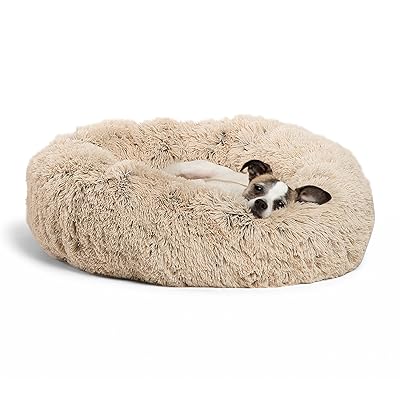


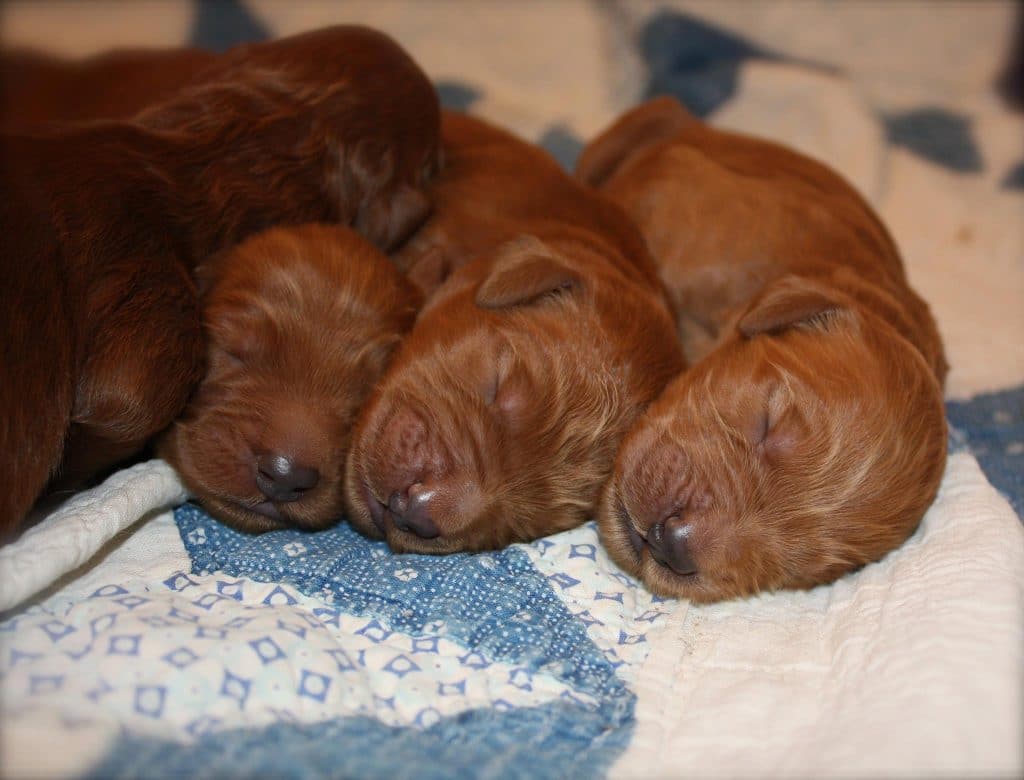 How to Choose a Puppy from A Litter
How to Choose a Puppy from A Litter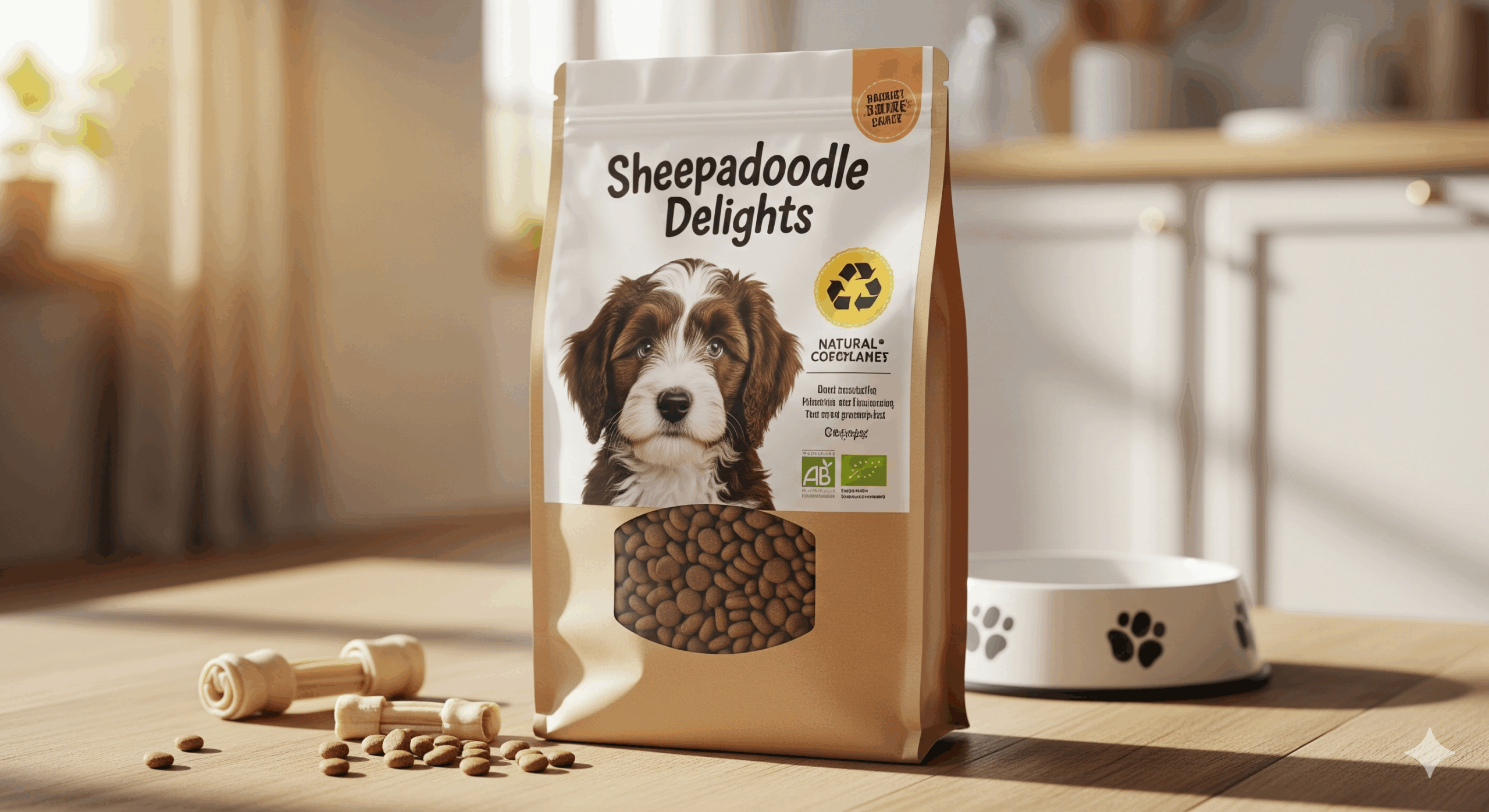 Best Puppy Food for Sheepadoodle: The Ultimate 2025 Guide for Healthy, Happy Puppies
Best Puppy Food for Sheepadoodle: The Ultimate 2025 Guide for Healthy, Happy Puppies Best Dog Brush for Shedding
Best Dog Brush for Shedding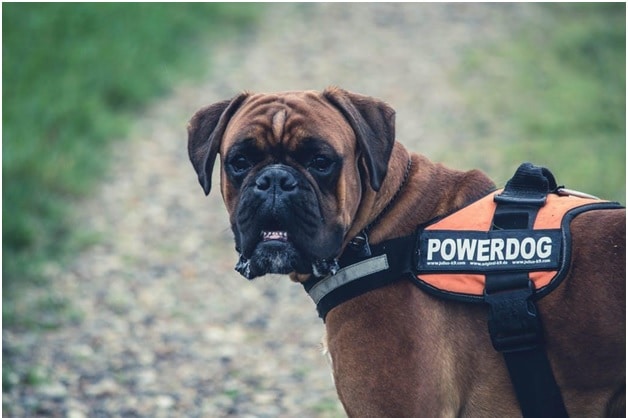 Best Dog Food for Boxers
Best Dog Food for Boxers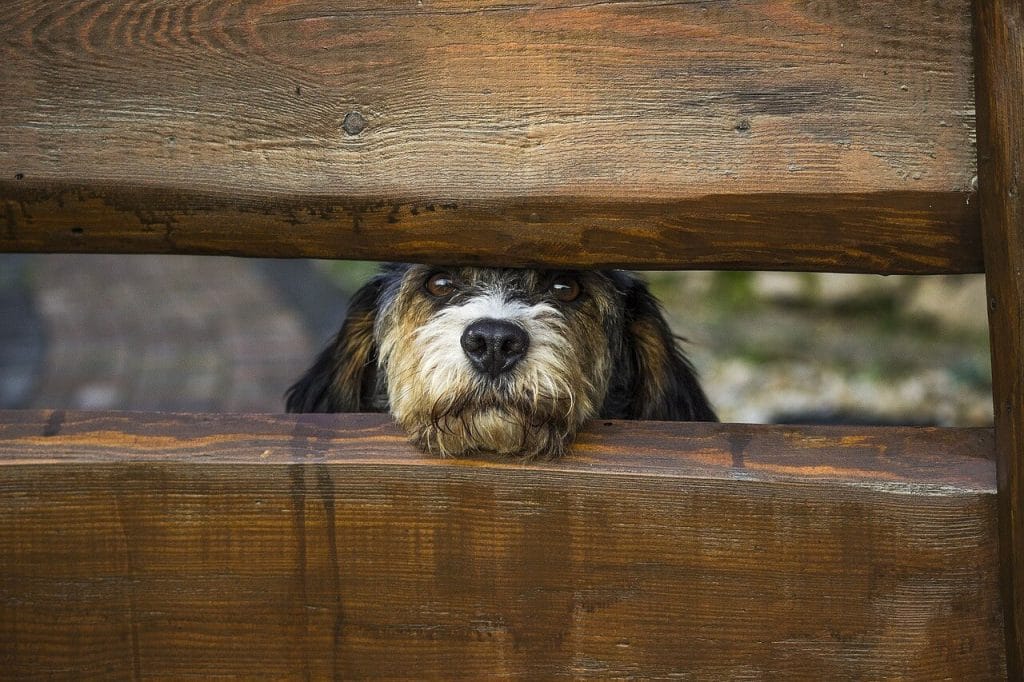 Best Wireless Dog Fences Review 2019
Best Wireless Dog Fences Review 2019
My fiance and I just recently decided that we may want to adopt a teacup Pomeranian puppy. We want to make sure before we get one that we know how to take care of it. We will be sure to make our dog get the exercise that it needs to keep him healthy.
We just adopted our 3 dog a 6 week old puppy named Tiny Pearl. She’s a brindle mix puppy. Daisy and Freddy haven’t figured out yet what to do with her. She sleeps in her crate at night. Whines when she needs to go potty. We’re looking forward to a great time with her.
I love my puppy so much but it is hard to get her To sleep in her cage.
Try to put a blanket it the cage with her and her toys n u can ask so out a blanket over the cage and tell her a key word like not not or go to sleep if u only have the puppy it’s not used to being alone it will just take time and a lot of work for her to become clam in her cage
I use a alarm clock that whineds up and put it under her blanket. It resembles her mamas heatbeat.
I found this to be one of the most helpful articles I’ve read when preparing for our puppy. Thank you for all the great tips.
Thanks Christy!
Our breeder insisted we take our Golden Retriever puppy home at 6 wks. All developmental issues seem to be normal except for the puppy’s desire to pee very frequently and without discretion to where. The effort to pee usually only produces a small amount. Doesn’t appear to be painful for the puppy (UTI ?). Is this normal?
Greg,
My breeder is asking me to bring home my miniature schnauzer at 6 weeks. He will not have been any shots, etc. I am concerned about the peeing. How often will he have to go out? I am going to crate train him.
I wanted to thank you for going over how you can take care of a six-week old puppy. It’s good to know that you can start teaching a puppy as you are playing with them. This seems like a good way to teach them to be obedient early on so they can respond better as they get older.
Me and my wife have a 6 week old puppy who does not sleep more than two hours every night, wakes up crying and howling, we take him outside to potty then try to put him back to bed in his crate but he wants to play how do we get him to go back to sleep or sleep longer???? How do we get our 6 week old puppy to stop struggling to get out of our arms when we are holding him or cuddling him?
You can make sure it has blankets and toys even small amount of milk in dish and after outside time get it dark stay near by say night night put it down walk away kepp it up it will work if you hold baby to mush it will only want more when you want to cuddle say hug time give it treat or say good baby when it’s still it will learn you won’t it to cuddle
Hai DAWN,
Your article is great. I have a 6-week old puppy. I like my puppy. Now your tips really will help me with my puppy take care. Thank you for share this excellent post.
Priyota Parma
Executive Consultant
Dog Mexico
This article highly helpful especially for new puppy parents. That part of getting the puppy to answer nature call on a newspaper, can it really work.
Great article address a very relevant issue.
I always like to stress the need to be committed to the well being our our precious canine buddies.
Well, that commitment, patience, concern, affection…..has to be way more with a 6 week old puppy. It is the perfect time to ensure they are well checked with the right nutritional requirements.
Once again, great job on your site!
FrenchbulldogdogBreed is specializing in breeding quality french bulldog puppies of different species like the Black and tan french bulldog puppy,white french bulldog puppy, Blue Fawn french bulldog puppy, Blue french bulldog puppy, Brindle french bulldog puppy, Chocolate french bulldog puppy, Fawn french bulldog puppy, Lilac french bulldog puppy, Merle french bulldog puppy, Sable french bulldog puppy, and White french bulldog puppy. We aim to produce quality French Bulldogs who are both fantastic, socialized companions that show excellent prospects. We go the greater length to ensure that all our puppies leave our home very healthy and are ready to become hugely anticipated addition to your family.
Thank you so much for your advice about how much exercise a puppy might need to grow healthy. Ever since my son has been asking for a pet dog as a birthday gift, I’ve been preparing our house for all the things we need to do to make sure it grows up properly. I knew for a fact that playtime was going to be important, but I didn’t know for how long, so I’ll make sure I prepare my yard and talk to my son about it before we look for any puppy breeders we can get his first pet from.